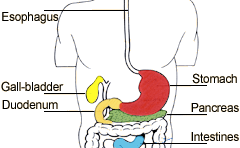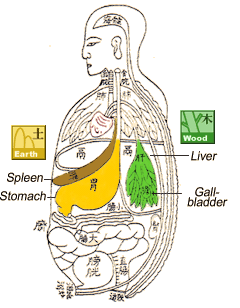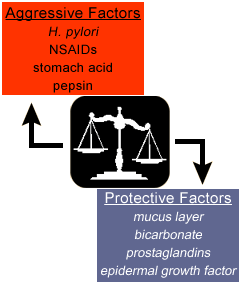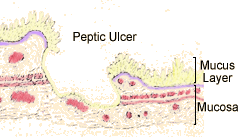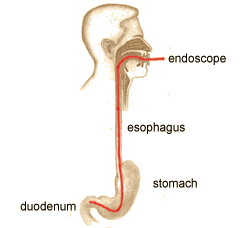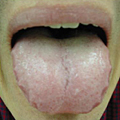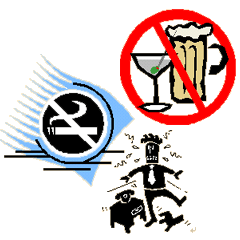Western Medicine
The short-term goals of peptic ulcer disease (PUD) treatment are to promote ulcer healing, prevent potential complications, and when h. pylori is present, provide an optimal environment for an effective antibiotic therapy. The long-term goals of treatment include resolving the ulcer, preventing recurrence and avoiding potential complications. The treatment plan for PUD differs by the cause (NSAID vs. non-NSAID users) and location (stomach vs. duodenum) of the ulcer. The medications used in PUD management include acid suppressants (antacids, histamine-2 receptor blockers, and proton pump inhibitors) and gastric mucosal protectants, for relief of symptoms and to promote ulcer healing, and antibiotics to eradicate h. pylori when it is present.
NSAID induced ulcers are generally treated by stopping NSAID use and providing acid suppressive therapy. Increased mucosal protection may also be included in the treatment plan in people who cannot stop taking NSAIDs. Non-NSAID induced ulcers are usually caused by h. pylori and are treated with a combination of antibiotics and acid suppressive therapy. In both NSAID and non-NSAID induced ulcers, acid suppressive therapy is given in higher doses and for a longer duration for stomach ulcers than for duodenal ulcers because stomach ulcers take longer to heal. Please refer to the text below and table (1) for details on the medications used in the treatment of PUD.
I. Acid suppressants
1. Antacids
Antacids neutralize acid in the stomach and prevent activation of pepsin. They provide short-term (45 minutes to 3 hours) relief of ulcer symptoms. Drawbacks to antacid use include side effects, such as constipation and diarrhea, and the potential to interact with other drugs.
2. Histamine-2 (H2)-receptor blockers
H2-blockers work by blocking the histamine stimulated secretion of acid by the parietal cell. Although infrequent, potential side effects include: diarrhea, headache and mental status changes in elderly persons. Patients taking cimetidine need to be especially cautious of using other prescribed and over-the-counter medications as there are a lot of drug interactions associated with this drug. The major drawback to the use of H2-blockers is the potential for development of tolerance to the acid suppression effects of the drugs.
3. Proton pump inhibitors (PPIs)
Proton pump inhibitors (PPIs) are the most potent acid-suppressing medications in use today. They block acid secretion at its source by binding directly to the proton pump which is the final step in the metabolic pathway of acid secretion. These medications may also facilitate the transport of anti- h. pylori antibiotics to the site of infection. Most people who take PPIs experience little to no side effects, but the most common potential side effects include nausea, diarrhea, abdominal pain, dizziness or headache. Patients taking omeprazole need to be especially cautious of using other medications as there are a lot of drug interactions associated with this PPI. Drug interactions may also occur with lansoprazole, but are far less frequent.
II. Gastric mucosal protectant
Sucralfate forms a physical barrier over ulcerated tissue to protect it from aggressive factors. The drug is not absorbed into the body to any significant extent and is not an acid suppressant. Side effects with sucralfate are uncommon, but may include constipation, nausea, flatulence and gastric discomfort. Sucralfate may reduce the absorption of other medications, so it is a good idea to separate this medication from others by at least 2 hours.
III. Antibiotics
Antibiotics are used to eradicate h. pylori when it is present. The antibiotics that are commonly used for this purpose include bismuth subsalicylate, metronidazole, amoxicillin, tetracycline and clarithromycin. Important patient information about these antibiotics is listed below.
Bismuth subsalicylate
- Shake the liquid well before using;
- Chew tablets or allow to dissolve in the mouth. Do not shallow whole;
- May cause dark discoloration of tongue or stool.
Metronidazole
- May cause harmless discoloration of urine;
- Avoid alcoholic beverages for the entire time you are taking this medication;
- You may notice a metallic taste in your mouth;
- Take with food to decrease stomach upset.
Amoxicillin
- You can take this medication with or without food;
- Females using oral contraceptives should use an additional method of contraception during treatment.
Tetracycline
- Take this medication 1 hour before or 2 hours after meals;
- Do not take any antacids, iron, or dairy products for 2 hours before or after this medication;
- Avoid prolonged exposure to sunlight and use sunscreen when if you are going to be out in the sun;
- Females using oral contraceptives should use an additional method of contraception during treatment.
Clarithromycin
- You can take this medication with or without food;
- You may notice an abnormal taste in your mouth.
If you are found to have h. pylori infection, your treatment regimen should include at least two of these antibiotics. Treatment with just one antibiotic has been found to be highly ineffective in eliminating the organism. It is very important that you adhere to the prescribed treatment and finish the entire course of antibiotics in order to aid in successful eradication of h. pylori. Please refer to table (2) for a summary of commonly used anti-h. pylori treatment regimens.
Chinese Medicine
In TCM, treatment for peptic ulcer is based on "disharmony patterns," or therapies according to the western symptoms of peptic ulcer syndromes. An alternative is to integrate western and Chinese approaches to create a synergetic effect on the disease, thus enhancing clinical efficacy. The following are brief introductions to TCM approaches:
A. Treatment based on TCM syndromes
Qi stagnation
Therapeutic aim: Soothing the liver to regulate qi. Commonly used prescriptions are modified chaihu shugan tang, sini san and xiaoyau san.
Sample of Prescription: chaihu shugan tang
| chai hu |
Chinese tororwax root |
| chen pi |
dried tangerine peel |
| shao yao |
peony |
| zhi ke |
bitter orange |
| zhi gan cao |
liquorice root (processed with honey) |
| chuan xiong |
Szechuan lovage |
| xiang fu |
nut grass |
Heat retention
Therapeutic aim: Soothing the liver and eliminating heat. Commonly used prescriptions are modified huagan jian, zuojin wan and banxia xiexin tang.
Sample of prescription: banxia xiexin tang
| ban xia |
pinella tuber |
| huang qin |
baical skullcap |
| gan jiang |
fried ginger |
| ren shen |
ginseng |
| zhi gan cao |
liquorice root (processed with honey) |
| huang lian |
golden thread |
| da zao |
common jujube fruit |
Yin deficiency
Therapeutic aim: Nourishing yin to strengthen the stomach. Commonly used prescriptions are modified
yiguan jian, yangwei tang and liuwei dihuang tang.
Sample of Prescription: yiguan jian
| sha seng |
adenophora |
| mai dong |
dwarf Lily-turf |
| dang gui |
Chinese angelica root |
| sheng di |
dried rehmannia root |
| qi zi |
Chinese wolfberry fruit |
| chuan lian zi |
toosendan fruit |
Deficient cold
Therapeutic aim: Warming the middle burner to strengthen the spleen. Commonly used prescriptions are modified huangqi jianzhong tang, sijun zi tang, lizhong tang and liangfu wan.
Sample of Prescription: huangqi jianzhong tang
| huang qi |
Mongolian milkvetch root |
| gui zhi |
cassia twig |
| zhi gan cao |
liquorice root (processed with honey) |
| da zao |
common jujube fruit |
| shao yao |
peony |
| sheng jiang |
fresh ginger |
| yi tang |
maltose |
Blood stasis
Therapeutic aim: Activating blood to resolve stagnation. Commonly used prescriptions are xuefu zhuyu tang and gexia zhuyu tang.
Sample of Prescription: xuefu zhuyu tang
| dang gui |
Chinese angelica root |
| sheng di |
dried rehmannia root |
| tao ren |
peach seed |
| hong hua |
safflower flower |
| zhi ke |
bitter orange |
| chi zhao |
common peony root |
| niu xi |
twotooth achyranthes root |
| jie geng |
balloonflower root |
| chuan xiong |
Szechuan lovage |
| chai hu |
Chinese tororwax root |
| gan cao |
liquorice root |
During the treatment, herbs like liquorice root (gan cao), tendrilleaf fritillary bulb (chuan bei), common bletilla tuber(bai ji), notoginseng (san qi) rhubarb (da huang) are added in the prescription for additional relief of dyspeptic symptoms. Some prescriptions to astringe (lessen) acid secretion are effective for related complaints, e.g. mixed powder of thunberg fritillary bulb(zhe bei mu) and cuttle-fish bone (wu zei gu) can be used.
B. Single Proven Prescription
In practice, a lot of recipes have been proved effective against the disease but were not listed in medical journals. These recipes do not follow any particular diagnostic rules in TCM but are used only when the disease is confirmed as peptic ulcer. For example pearl powder is effective in providing relief from symptoms and speeding up the healing of an ulcer.
C. Acupuncture and moxibustion
This method is used to provide pain relief, and commonly applied according to the differentiation of the affected meridian. For example, in the case of liver and stomach disharmony, acu-points in the Leg Yang Ming Stomach Meridian and Leg Jue Yin Liver Meridian are chosen.
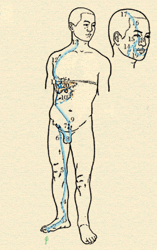
Leg Jue Yin Liver Meridian
D. Others
Besides the above therapeutic methods, dietary therapy, qi-gong, massage and physical exercise benefit the patient. These methods complement the drug therapy to improve total efficacy.

